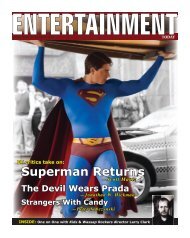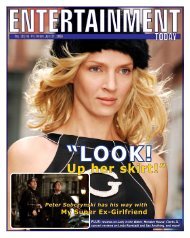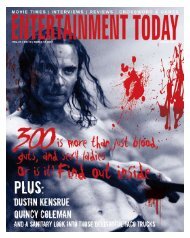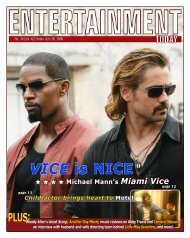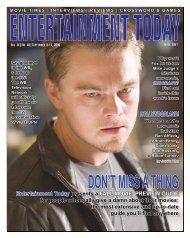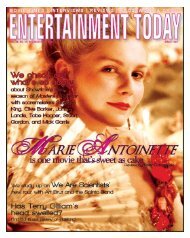LOVE
this issue of Entertainment Today
this issue of Entertainment Today
Create successful ePaper yourself
Turn your PDF publications into a flip-book with our unique Google optimized e-Paper software.
views, the stuff with the PI, and the stuff<br />
involving my submission of the film. I had<br />
to balance the interviews with the PI section<br />
because people would feel like I was pulling<br />
away from the PI stuff for too long. I chose<br />
to limit the focus to how the “NC-17” is<br />
affecting art filmmakers, which I think is the<br />
real significance. This is where gay films and<br />
art films are getting censored. That is where<br />
the most profound impact is, and that is why<br />
I kept the focus there.<br />
PS: Another recurring theme in the film is<br />
just how arbitrary the system seems to be at<br />
times. Something that is perfectly acceptable<br />
for an “R” in one film will later be deemed<br />
worthy of an “NC-17” in another. How<br />
surprised were you to discover these rampant<br />
disparities during the process of making<br />
your film?<br />
KD: One thing is that all of the filmmakers<br />
that I interviewed whose films initially or<br />
finally received an “NC-17” rating thought<br />
that they had made an R-rated film. To me,<br />
that was astounding,<br />
and that shows how<br />
little information<br />
there is out there.<br />
Again, that plays to<br />
the MPAA’s benefit:<br />
if there are no written<br />
standards, no one can<br />
call them on it and<br />
say that they can’t give<br />
a film an “NC-17”<br />
because they gave<br />
another film like it<br />
an “R.” This allows them to manipulate the<br />
system to their benefit. I think the inconsistencies<br />
are there in part because there are<br />
no written standards; it is impossible to rate<br />
over 300 movies a year without any written<br />
standards and not have inconsistencies.<br />
Atom Egoyan and Kirby Dick discuss the MPAA.<br />
PS: The turning point of the film comes<br />
when you submit This Film Is Not Yet Rated<br />
to the MPAA for classification. What<br />
exactly were they seeing in the version that<br />
you submitted?<br />
KD: They saw pretty much everything you<br />
see in the film up until the point where I<br />
submit the film. That included nearly all of<br />
the sex scenes that we showed that you see<br />
in the final version of the film.<br />
PS: There was some talk a while ago about<br />
how you discovered that the MPAA actually<br />
made a copy of the film—in complete violation<br />
of their strict views toward piracy—and<br />
that you were considering legal action.<br />
KD: A few days before I submitted the film,<br />
it occurred to me that they were probably<br />
going to want to make a copy of it. I called<br />
them up and asked if they made copies of<br />
the films that they submitted for ratings, and<br />
was told that only the raters would see it, not<br />
even the staff. A few weeks after I submitted<br />
it, I heard that Dan Glickman [head of the<br />
MPAA] had seen the film. Dan Glickman<br />
is in Washington, and the Ratings Board is<br />
in Los Angeles. So I called up Joan Graves<br />
[Chair of the Ratings Board] and asked if<br />
they had made a copy of it. She says, “Um .<br />
. .er . . .not to my knowledge.” I think they<br />
knew that I was on to them, or at least that<br />
I had my suspicions. About five days later,<br />
Greg Gaffner—who makes an animated<br />
appearance as the MPAA lawyer in the<br />
film—called up and said, “Kirby, I have to tell<br />
you that we have made a copy of your film,<br />
but you don’t have to worry: it is safe in my<br />
vault.” You can imagine how reassuring that<br />
was. What is incredible is that the MPAA<br />
defines piracy as any single unauthorized<br />
duplication of a copyrighted work—that is on<br />
their own website! That is quite an example<br />
of hypocrisy.<br />
PS: Were there any legal concerns or worries<br />
about the scenes in the film in which you and<br />
your detectives track the various members of<br />
the Ratings Board on the street in order to<br />
get them on film and identify them?<br />
KD: Everything we did in the film was 100%<br />
legal, and we worked with an attorney all the<br />
way through. It had to be legal because we<br />
were putting it all on film and it was going<br />
to be up on the screen<br />
as evidence. I had<br />
no qualms about it,<br />
because what they are<br />
doing is in the public<br />
interest, so we have<br />
a right to see them.<br />
Secondly, we always<br />
shot them in public<br />
places, so we were<br />
within the letter of the<br />
law. People have asked<br />
me if I had any qualms<br />
about following these people around, and I<br />
say absolutely not. What I feel is wrong is<br />
that these people have participated in a system<br />
where they have made decisions that are in<br />
the public interest yet have agreed to remain<br />
anonymous. That, I think, is entirely wrong.<br />
If people are making decisions in the public<br />
interest, they should either be public people<br />
or not participate in that system.<br />
PS: In your view, is there any way that the<br />
MPAA can be fixed so that it becomes a<br />
fairer and more equitable institution for all<br />
filmmakers, or does it need to be entirely<br />
dismantled?<br />
KD: The studios are very happy with the<br />
“NC-17.” As John Waters said, “The studios<br />
would sell spread-eagle-pink if they could.”<br />
However, that isn’t where their demographic<br />
is, and that isn’t where they make the most<br />
money—they make that from adolescents.<br />
They don’t want to go into that area, and they<br />
don’t want their filmmakers to go into that<br />
area, so the fact that the “NC-17” is considered<br />
off-limits actually helps corral filmmakers<br />
and keeps them making films that are aimed<br />
towards adolescents. What can be done? I<br />
don’t know. If it was professionalized—and<br />
who knows if they will do that—and if it was<br />
made transparent—which could change if<br />
there was enough pressure—it could make<br />
it somewhat more consistent. That would be<br />
an improvement. What I want is to initiate<br />
a discussion, and the more that people see<br />
this, the more they will know that people<br />
are pissed-off, and there will be a cumulative<br />
pressure to force some change. P<br />
ENTERTAINMENT TODAY SEPTEMBER 15-21, 2006 |26|<br />
Justin Rice heads a cast of non-professional actors in Andrew Bujalski’s naturalist Mutual Appreciation.<br />
naturalist film is scripted. Having written his<br />
first draft in NY (where the fulcrum of the<br />
entire project, actor/musician Justin Rice, lives)<br />
a year or so before lensing commenced, Bujalski—as<br />
he had with Funny Ha Ha—basically<br />
gave the meticulously re-worked “final draft” to<br />
his actors (all of whom are non-professionals,<br />
most of whom he met through mutual friends<br />
or, in Clift’s case, literally on the street) and<br />
allowed them to “do what needed to be done<br />
to make it sound real.” The result is that his<br />
script’s structure is present, but the content<br />
becomes more organic. “All the characters<br />
should sound like they live in the same universe,<br />
but not exactly sound just like me.”<br />
In truth, Bujalski—who unconsciously<br />
fiddles with his flimsy cardboard coffee cup<br />
holder as he talks to me—seems so unfazed<br />
by the praise some critics have bestowed upon<br />
him that his equanimity almost reads as disappointment<br />
with what he thought would have<br />
been a crazier ride. “I don’t trust anything<br />
good that happens to me,” he says as<br />
he speaks about how even though<br />
he’d like to make at least one more<br />
movie in the same vein as his first<br />
two, he doesn’t necessarily believe<br />
he’ll be able to pull it off.<br />
We go into a bit about<br />
Eternal Recurrence: about the<br />
feeling that he and I—and<br />
his characters—retain about<br />
not really moving forward…<br />
even when we seem to be<br />
progressing or, dare we say,<br />
growing up into “adults.”<br />
“Maybe when we have kids, we’ll<br />
feel like something new is happening,” he suggests.<br />
In such a way, Bujalski may be speaking<br />
for all of us who find disappointment even with<br />
our successes as we grow older. It was Too Much<br />
Coffee Man’s Shannon Wheeler who said in one<br />
of his stories, “Somewhere between anticipation<br />
and nostalgia, we were supposed to be happy.”<br />
This incisive epigram could easily encapsulate<br />
Bujalski’s central sensibility.<br />
The filmmaker’s real charm—the reason he’s<br />
not just another “kid” living on the fringe and<br />
spending his days brooding over the ineluctable<br />
degradation of contemporary art, or editing<br />
a free weekly entertainment tabloid—is his<br />
ability to so effortlessly make light of Wheeler’s<br />
eschatological statement.<br />
Traditionally, this is the point in the article<br />
where the writer would posit something to<br />
the effect of, “So, if only Bujalski could find<br />
a supportive studio or an amenable big-time<br />
manager…” But, with this fidgety thirty-yearold,<br />
it’s really a moot statement. He really<br />
doesn’t require these things to do what he<br />
does or to continue, his humble exigencies<br />
already easily satisfied on his own. In fact, ask<br />
him about why he hasn’t sent his film in to<br />
the MPAA for a rating, and he’ll look back at<br />
you through his bespectacled eyes, and, with<br />
earnest puzzlement, ask, “What will that do<br />
for me?” After all, Bujalski takes care of the<br />
distribution and exhibition of Mutual pretty<br />
much by himself.<br />
This article is almost meaningless for his<br />
“career,” less maybe garnering ten more filmgoers<br />
who might check out Mutual Appreciation<br />
or buy Funny Ha Ha on DVD. No, this<br />
article is instead a paean of the independent<br />
cinematic spirit that—though it was commodified<br />
in the 1980’s, then sublimated as<br />
less a mode of production<br />
and more of a genre/aesthetic<br />
in the 1990’s—still<br />
exists in America today<br />
and can be found (however<br />
exclusively) in the films of<br />
Andrew Bujalski.<br />
Yes, along with Mel Gibson,<br />
Bujalski is a true American<br />
independent. Unlike Mel,<br />
however, Bujalski produces<br />
apt portraits of humanity that<br />
attempt to and succeed at adding<br />
to the common good and<br />
cinematic continuum. Mel would<br />
have to self-finance and make at<br />
least two more like The Man Without a Face<br />
to catch up.<br />
Maybe a year from now, Bujalski will be<br />
back substitute teaching in Boston with a fond<br />
memory of his years as a favorite filmmaker<br />
of Amy Taubin. It wouldn’t surprise Bujalski.<br />
But, if he ever gets a couple o’grand, a couple<br />
‘o buddies, and someone’s scenester apartment,<br />
you can be sure it’ll just be a matter of time<br />
before he busts out a camera…even if the<br />
finished project is screened in his garage for<br />
an exclusive audience comprised only of his<br />
nearest and dearest. P



